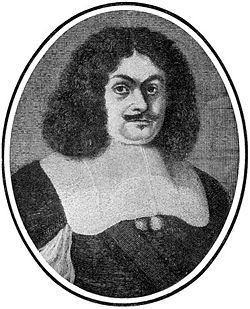Gryphius Andreas

Gryphius, Andreas (real surname – Greif) (October 2, 1616, Glogau [Głogów], Silesia – July 16, 1664, same place), was a German poet and playwright, and a representative of the Baroque literary school. Among his rich creative legacy—including odes, epigrams, sonnets, comedies, and tragedies—the tragedy "Ketevan the Georgian, or Unbreakable Fortitude" (Katharina von Georgien) (written in 1646–47, published in 1657) is especially noteworthy.
The play is one of the greatest works about the martyrdom of Queen Ketevan of Georgia, who represents a moral ideal for the author. The play is a typical example of the Baroque style and includes historical figures such as Alexander II, King of Kakheti; Teimuraz I; Luarsab II, King of Kartli; Grand Mouravi Giorgi Saakadze; and others.
Upon its publication, "Ketevan the Georgian" ("Catharina von Georgien") was staged at the theater in Wohlau (Wołów) and was subsequently performed in various German theaters. The production sparked great interest in Georgia. After the myth of Medea of Colchis, the martyrdom of Queen Ketevan became one of the most popular themes.
The Georgian public first learned about this play in 1904, when the newspaper "Tsnobis Purtseli" (No. 2654) published information sent from Freiburg, Germany, by I. Ramishvili, titled "A Georgian Woman in German Dramatic Art."
The play was translated into Georgian and published in 1975, accompanied by essays and commentary by Sh. Revishvili and A. Gelovani (the translator). In 1982, it was staged at the Rustaveli Theatre by Saarbrücken-based director Prof. Hermann Wedekind, and in 1984, at the “Cave Theatre” in the town of Balve. This production was even welcomed by the Roman Pope.
Numerous studies and articles have been dedicated to Gryphius and his play. Notable among them are the works by A. Bibichadze, Sh. Revishvili, T. Natroshvili, I. Tabaghua, V. Kuprava, Z. Abashidze, J. Burduli, and others.
Litertature: ბ ი ბ ი ჩ ა ძ ე ა., ა. გრიფიუსი და მისი ტრაგედია „კათარინა ქართველი", თბ., 1950 (ავტორეფ.); ნ ა ტ რ ო შ ვ ი ლ ი თ., ათასი ელვის ნათელი, «ლიტერატურული საქართველო », 1986, 16 მაისი; ნაჭყებია მ., ქართული ბაროკოს საკითხები, თბ., 2009; რევიშვილი შ., გერმანულ-ქართული ეტიუდები, თბ., 1977; ხ ა ვ თ ა ს ი გ., ნარკვევები გერმანული ლიტერატურის ისტორიიდან, ტ. 1, თბ., 1953.
A. Gelovani


